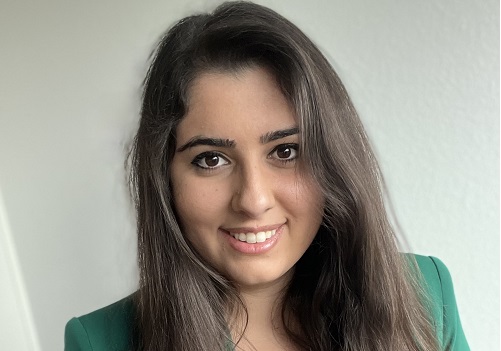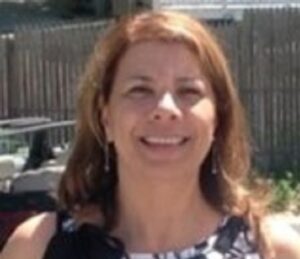Common Future, a dynamic, majority-BIPOC nonprofit organization that incubates, co-creates, and funds field-defining initiatives to advance economic and racial justice, recently announced the first grant recipients of its Common Future Accelerator Initiative. Launched in October 2022, the Accelerator supports 10 organizations developing models to close the racial wealth gap by helping to remove the social, financial, and political barriers that stand in the way of transformative change.
SEE Change spoke with the entrepreneur and director of portfolio advancement, Andrea Perdomo, to learn more about the challenges facing BIPOC founders and how this new initiative is designed to confront the racial wealth gap head-on.
The Accelerator was “inspired by the personal hardships I experienced as a Latina co-founder in the tech-sector,” said Andrea Perdomo, Common Future’s director of portfolio advancement
For some background, please describe the mission of Common Future and when/why it launched.
Founded in 2001, Common Future works to close the racial wealth gap. We are powering community-driven solutions to advance racial and economic equity and building a future where all people—no matter their race and class—have power, choice, and ownership over the economy.
The reality is that our current economic system does not work for everyone. Generations of Black and Indigenous communities and other communities of color have been and are currently intentionally locked out of wealth and power. Centuries of policies that systematically favor a select few cause persistent economic inequities that hold us all back.
To put it simply – we need a new economic system. The economic systems in place now were not built to benefit everyone equally: our current economy intentionally limits opportunities and prevents well-being for BIPOC communities in the United States. No matter our differences, we all want financial well-being for our families and communities. The facts tell the story:
- If we change nothing, the Black-white wealth gap will cost the U.S. GDP 4-6% or $1 trillion by 2028.
- The median white family in the U.S. has 41 times more wealth than the median Black family.
- The racial wealth gap between black and white families grew from about $100,000 in 1992 to $154,000 in 2016 and continues to grow.
- Black millennials have ~$5,700 less wealth than previous generations; and
- The median wealth of Black people today is less than it was in 1983, the year in which the federal government started collecting household data on wealth.
What inspired the $500k Accelerator?
We’re fighting for a world where all communities have the economic independence to build a future in which we all can thrive. We want to support organizations—that have designed and tested solutions in their own communities, that have funders or partners, and are now ready for growth and scale—by providing them equitable access to capital, influence, and knowledge. Then we’ll get them connected to the right people, so that they can take your vision to the next level—and empower the communities you serve.
We’ve already shifted $280 million toward community investment across the United States, and thanks to our merger with Uncharted, have a demonstrated 12-year track record as a leading social impact accelerator for over 200 organizations who have raised over $390M—with talent, knowledge, and expertise to accelerate the work of community-led ventures dedicated to economic justice. This, paired with Common Future’s network of entrepreneurs, funders, mentors, thought leaders and policy makers, makes our approach to economic justice both unique and proven.
Our relationships to local and national trusted leaders also give us an aerial perspective that bolsters our ability to scale transformative solutions. Our diverse team of entrepreneurs, community organizers, financial activists and policy wonks serve as co-conspirators to wealth-builders on the ground, providing the top-notch partnership, capital, and support typically denied to people of color.
What challenges are you trying to tackle with this accelerator? Why is it so important now?
Throughout the start of my entrepreneurial journey, I was often the only woman in the room, and always the only Latina. What’s more, the implicit — feeling I didn’t belong — was made explicit through the advice I received from investors. Following said advice would have had me suppress my age, my femininity, and my cultural identity, all so that I could be taken seriously by men — which in turn stripped me of the attributes that made me unique and well-positioned to address the problems I was solving.
When I first started, I didn’t know anyone in the tech sector which locked me out of opportunities to access capital. My network — and that of my company — only grew after we were admitted to an accelerator program, after years of trying. It was those mentors, advisors and investors that helped get us to the next stage.
There was also a steep learning curve when it came to the language and nuance, and I had to get up to speed — and fast. As a first-time entrepreneur, there was a strong pressure to have that knowledge — which I had never had access to learn in the first place — up front, and readily available for validation.
Finally, there was also a lack of understanding from investors: The typical investors could not relate to the product and mission of our company. We were not building a product for them, we were building a solution for our community — in my case, for young Latinas. Because investors failed to understand the need for my solutions, and therefore failed to see the value for my company, we had to pursue non-traditional capital through crowdfunding and bootstrapping. Only then, were we seen worthy of investment dollars.
The Accelerator is important because many BIPOC (Black, Indigenous or Person of Color) founders lack access to the capital afforded to those with access to generational wealth and the connections that come with it. This means being locked out of first-in capital from friends and family rounds, angel investors, and seed stage investment.
Name some recipients and how this funding will help them achieve their own mission
The new Common Future Accelerator will spend three months investing in a cohort of 10 organizations that are actively working to dismantle economic inequality by giving power back to communities left out of prosperity. Each selected organization will receive an unrestricted grant of $50,000 that they may use as they see fit, and Common Future does not have any requirements on the allocation of these funds.
From our conversations with these participants, we know that this capital will support many of them with building their teams, creating programs that will close the racial wealth gap and invest in their infrastructure to scale their impact. Here’s a bit more information about three of the Accelerator cohort organizations:
The Tender Foundation, based in East Point, Georgia
In Georgia, Black women earn only $0.63 on the dollar to white men, and children born into poverty in Atlanta only have a four percent chance of making it out of poverty. The Tender Foundation is providing a safety net for single mamas living on the margins in Atlanta by providing $500 a month through a re-imagined Universal Basic Income model.
“Our team believes in old that phrase we always hear, ‘If you want to go far, go together,’” said founder Jaycina Almond and business operations manager Chaniece Davis. “We’re really excited to learn from Common Future and our peers, because in the end we all have the same goal of creating a more equitable future.”
COOK Alliance, based in San Diego, California
Food industry labor—either as unpaid labor, informal business, or underpaid back-of-house staff—has been historically undervalued and shouldered almost exclusively by low-income women and by people-of-color. The COOK Alliance has led the charge to pass the country’s first law allowing people to sell cooked meals from their homes, creating an innovative form of culinary entrepreneurship accessible to all, and particularly empowering for homemakers, caretakers, women, people of color, and immigrants.
“We are so grateful and excited to work with the Common Future team and utilize the resources, mentorship, community, and grant funding they provide to grow the home cooking movement. This will enable us to expand our advocacy and business education programs to create equitable economic opportunities for culinary entrepreneurs, the majority of whom are immigrants, women, and low-income community members,” said executive director Roya Bagheri. “We can’t wait to meet our new cohort members, share our experiences and challenges, and learn from our peers.”
Center for Cooperative Development and Solidarity – CCDS based in East Boston, Massachusetts
East Boston is one of the city’s fastest gentrifying neighborhoods. Yet, the pre-pandemic poverty rate was as high as 19%, with undocumented and English-limited immigrants experiencing greater discrimination. The Cooperative Center for Development and Solidarity – CCDS is a non-profit organization that helps build and create worker-owned cooperatives by empowering immigrant and women residents to take control of their lives.
“We are very excited to be selected as one of the Common Future grantees, because as a small community-based organization working in cooperativism and in the solidarity economy, it is hard for our work to be recognized and supported,” said general coordinator Luz Zambrano. “Having the support of Common Future will give us the most needed support in this stage of our development—such as coaching, technical assistance and general operating support. At the same time, it will bring national visibility to our work and connections with peers around the country.”
What more needs to be done to further economic justice? What’s your hope for the future?
At Common Future we believe the people closest to the problems are already leading models to restore community wealth, but these solutions require additional attention, support, and financial investment. We build power and move resources to the people and organizations building those models, co-creating the terms that center their needs. Then – with data on what works – we influence key sectors across philanthropy, impact investing, government, and corporations, showing that building economic power for excluded communities is possible and attainable.




